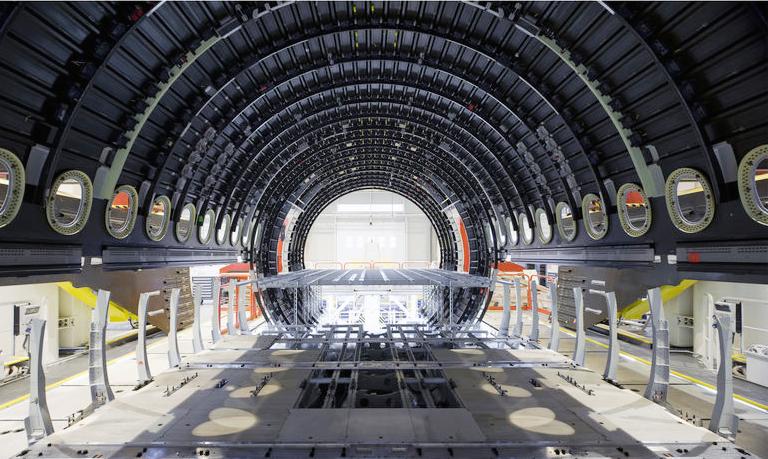Brief Guide to Aircraft Composite Materials
April 01, 2015
Applications
There are many applications of composites on aircraft, including fairings, flight-control surfaces, landing-gear doors, leading- and trailing-edge panels on the wing and stabilizer, interior components, floor beams and floor boards, turbine engine fan blades and primary wing and fuselage structures on new-generation aircraft.

Structure
Created from a combination of materials mixed together to achieve specific structural properties, the independent materials in composites do not dissolve or merge completely but rather act together as one. Component material of aircraft composites can often be physically identified as they interface with one another. By joining the various properties, a superior material is produced. Credit: Airbus

Advanced Composite Material
An advanced composite material consists of a fibrous material embedded in a resin matrix that is laminated with fibers oriented in alternating directions. This structure helps establish strength.

Fiber Orientation
The strength of the composite material depends on the orientation of the stacking sequence of the plies. When repairing a component made of composites, such as a fuselage section, it is critical to replace each damaged ply with another of the same material and orientation.

Applications
There are many applications of composites on aircraft, including fairings, flight-control surfaces, landing-gear doors, leading- and trailing-edge panels on the wing and stabilizer, interior components, floor beams and floor boards, turbine engine fan blades and primary wing and fuselage structures on new-generation aircraft.

Structure
Created from a combination of materials mixed together to achieve specific structural properties, the independent materials in composites do not dissolve or merge completely but rather act together as one. Component material of aircraft composites can often be physically identified as they interface with one another. By joining the various properties, a superior material is produced. Credit: Airbus

Advanced Composite Material
An advanced composite material consists of a fibrous material embedded in a resin matrix that is laminated with fibers oriented in alternating directions. This structure helps establish strength.

Fiber Orientation
The strength of the composite material depends on the orientation of the stacking sequence of the plies. When repairing a component made of composites, such as a fuselage section, it is critical to replace each damaged ply with another of the same material and orientation.

Applications
There are many applications of composites on aircraft, including fairings, flight-control surfaces, landing-gear doors, leading- and trailing-edge panels on the wing and stabilizer, interior components, floor beams and floor boards, turbine engine fan blades and primary wing and fuselage structures on new-generation aircraft.
The high strength, low weight and corrosion-resistant materials of composites are quickly becoming more important to aircraft structures. Here is a quick look at the construction and applications of composite materials in the aerospace industry.
Photo Credits: ThinkStock, unless otherwise noted.
Source: FAA Advanced Composite Material



